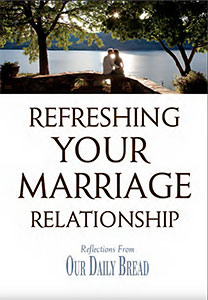“Why can’t you help out in the household chores more? What sort of husband are you?” the tired wife said in exasperation to her husband slouching on the sofa watching the news.
The husband sighed in frustration. After a long day of online meetings, this was his chance to catch a breather. All he wanted was a break, not more nagging. “Is that all you care about?” he retorted. “Isn’t that your job?”
Does this sound familiar? The circuit breaker has put a strain on some marriages as couples try to cope with changes at work, at home, and in church. In some homes, it has led not only to tension, but also to disappointment and disillusion with the marriage.
When marriages hit a rough spot, the key question we need to ask is: “Now what? What are we going to do about it?” This is where a commitment from both husband and wife to work through and resolve the issues is vital. Here are three suggestions on what we can do:
1. Let Our Marital Disappointment Help Us Face Our Disappointment with God
God is the One before whom we took our vows. He is the One we asked to bless our marriage. So, when we are unhappy in our marriage, it may seem that He has let us down. We may be holding Him accountable or accusing Him of breaking His promise of happiness to us. But as we struggle, we are at least taking Him seriously. And in our struggle, we can learn to look to Jesus.
No one has suffered the abandonment and abuse that Christ did in the course of His life and death. No one has experienced the kind of unfair treatment that He endured when He paid the price for our sins. Yet He lived and died and rose from the dead to declare that, in time, God always shows himself good and powerful and faithful to those who are willing to trust Him to the end. He can do the same for us in our marriage.
Christ showed us by His own example that we were not made to find complete fulfilment or security in any human relationship. He showed us that we are made to find our protection and contentment in God, and in this realisation can we be free to love and submit to one another.
2. Let Our Relationship with God Become Our Source of Marital Fulfilment
Followers of Christ are in a great position to face the issues that have brought disillusionment to their marriage.
In his book Men And Women: Enjoying the Difference, biblical counsellor Larry Crabb wrote: “The difference between godly and ungodly people is not that one group never hurts and the other group does, or that one reports more happiness than the other. The difference lies in what people do with their hurts.
“Either they do what comes naturally: use their hurts to justify self-centered efforts to relieve it, caring less about how they affect others and more about whether they are comfortable; or they do what comes unnaturally: use their hurts to better understand and encourage others while they cling desperately to the Lord for promised deliverance, passionately determined to do His will.”
Once we learn that our ultimate well-being depends on God and not on our spouse, we will begin to experience the strength of the Lord.
Once a husband believes that his relationship with God is more important than his relationship to his wife, he will begin to find a personal sense of significance that doesn’t depend on his wife’s responses or affirmation. He will begin to love her out of the love he has found in Christ (Ephesians 5:25).
Once a wife believes that her relationship with Christ is more important that her relationship with her husband, she can begin to find a source of security and acceptance that doesn’t depend on her husband’s ability to meet her needs. She can begin to accept her role as a wife out of the conviction that rightly-motivated submission is actually a way of submitting herself to the lordship and provision of Christ (Ephesians 5:22–24).
3. Let Our Dependence on God Become a Basis for Loving Interdependence
A husband and wife who depend on God, and who find strength and sufficiency in Him, will not be overly dependent on each other. Nor will they demand an unhealthy independence or domination.
God made man and woman unique, specially gifted beings in His image. The Bible helps us to understand how a husband and wife can be one, yet also be true to the unique person God made each to be.
God made woman to be a companion and helper her husband can depend on. Genesis tells us: “The Lord God said, ‘It is not good that man should be alone; I will make him a helper comparable to him’” (2:18).
Proverbs 31 describes an initiative-taking, God-gifted woman who did just that. There was an interdependent relationship between this couple in Proverbs 31. God gave the wife multiple gifts, and her husband apparently was not jealous of her gifts, nor did he deny her their use. We can assume that he loved her for the woman God made her to be. She, in turn, used her gifts in a way that produced harmony and marital success.
This brings us to 1 Corinthians 13: 4–8: “Love is patient, love is kind. It does not envy, it does not boast, it is not proud. It does not dishonour others, it is not self-seeking, it is not easily angered, it keeps no record of wrongs. Love does not delight in evil but rejoices with the truth. It always protects, always trusts, always hopes, always perseveres. Love never fails.”
You might want to read this passage again. Where the word love appears, put in your name. Now ask yourself: Is this how you treat your husband or your wife? This is what it means to love. Love takes action and trusts God to give the promise of marriage of couples who are willing to trust Him.



